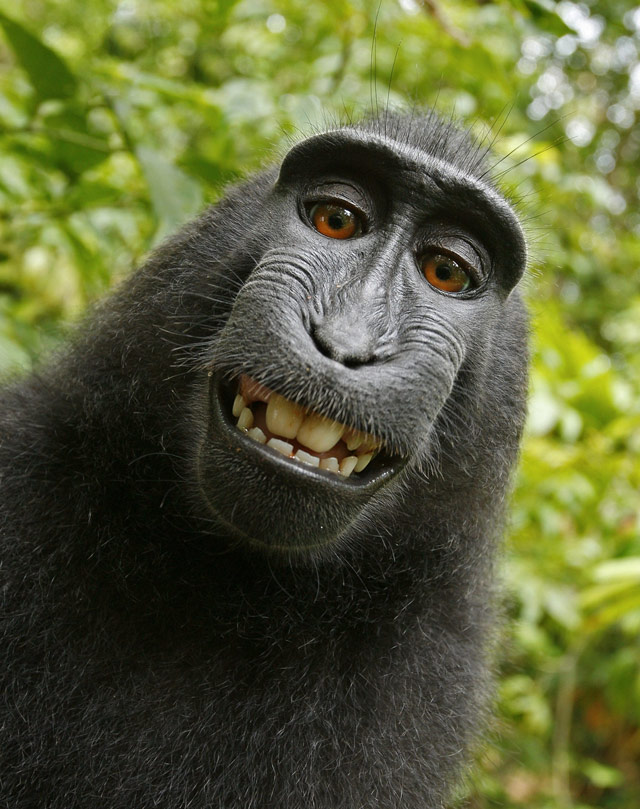
Photographer David Slater wants Wikipedia to remove his photograph of a monkey taking a photo of itself but Wikipedia has refused, saying that as the monkey was the photographer, Slater has no right to the copyright to the photo.
The Gloucestershire-based photographer now claims that the decision is jeopardising his income as anyone can take the image and publish it for free, without having to pay him a royalty. He complained to Wikimedia that he owned the copyright of the image, but a recent transparency report from the group, which details all the removal requests it has received, reveals that editors decided that the monkey itself actually owned the copyright because it was the one that pressed the shutter button.
But shouldn’t Wikipedia take it down anyway because they don’t have the monkey’s permission to release the photo into the public domain? (I mean, probably not…monkeys don’t have any rights under the law, yes?) (via @capndesign)
Update: A previous version of this post stated that Wikipedia said that the monkey held the copyright. They said no such thing…that was my poor paraphrase. In the US at least, monkeys obviously can’t hold copyrights. From the Compendium II of Copyright Office Practices, section 202.02(b) states:
The term “authorship” implies that, for a work to be copyrightable, it must owe its origin to a human being. Materials produced solely by nature, by plants, or by animals are not copyrightable.
Interesting phrase, “owe its origin to”…perhaps Slater has a point. (via @stvnrlly)
Update: According to a recent 1000+ page document produced by the US Copyright Office, a photograph taken by a monkey is “unprotected intellectual property”.
The US Copyright Office, in a 1,222-page report discussing federal copyright law, said that a “photograph taken by a monkey” is unprotected intellectual property.
“The Office will not register works produced by nature, animals, or plants. Likewise, the Office cannot register a work purportedly created by divine or supernatural beings, although the Office may register a work where the application or the deposit copy state that the work was inspired by a divine spirit,” said the draft report, “Compendium of US Copyright Office Practices, Third Edition.”
Update: PETA has filed a lawsuit on behalf of the monkey photographer, seeking to award the copyright and any sales proceeds to the monkey. Alt headline: PETA Thinks Famous Monkey Photographer Is Too Stupid To Manage Own Money.
Somehow not from The Onion: PETA is trying rebrand fish as “sea kittens”.
We’re going to start by retiring the old name for good. When your name can also be used as a verb that means driving a hook through your head, it’s time for a serious image makeover. And who could possibly want to put a hook through a sea kitten?
I guess that’s not any worse than Chicken of the Sea. (via design observer)
PETA — that’s People for the Ethical Treatment of Animals — recently revealed that in 2006, they put to death more than 97 percent of the cats, dogs, and other animals they took in for adoption.
The scale of PETA’s hypocrisy is simply staggering.
And somehow that seems like an understatement. (via wider angle)
Update: This press release was put out by the Center for Consumer Freedom, a group that holds some questionable views:
The Center for Consumer Freedom has drawn criticism from several groups for its startup funding from the Philip Morris tobacco company. It has been described as an astroturf group that portrays itself as a grassroots organization while actually being funded by the fast food, meat, and tobacco industries. It is also criticized its efforts to portray groups such as the Humane Society of the United States as “violent” and “extreme”, and for its opposition to banning the use of trans fats. The group Citizens for Responsibility and Ethics in Washington has also campaigned against the CCF’s validity as a non-profit tax exempt charitable organization, filing an IRS complaint in 2004 attacking CCF’s claims that its advocacy campaigns were “educational” in nature. Some corporations, including PepsiCo and Kraft Foods, have declined to work with CCF, saying they do not agree with some of the group’s arguments or its approach to advocacy.
A factsheet on PETA’s site says they are in favor of animal euthanasia is some cases.
Because of the high number of unwanted companion animals and the lack of good homes, sometimes the most humane thing that a shelter worker can do is give an animal a peaceful release from a world in which dogs and cats are often considered “surplus” and unwanted. PETA, The American Veterinary Medical Association, and The Humane Society of the United States concur that an intravenous injection of sodium pentobarbital administered by a trained professional is the kindest, most compassionate method of euthanizing animals. The American Humane Association considers this to be the only acceptable method of euthanasia for cats and dogs in animal shelters.
Some other stuff I read online indicated that PETA rescues pets who were going to be euthanized under inhumane circumstances in order to provide them with more compassionate deaths. A complicated situation, to be sure…not sure what to think. (thx, gwen, chris, and jason)






Stay Connected